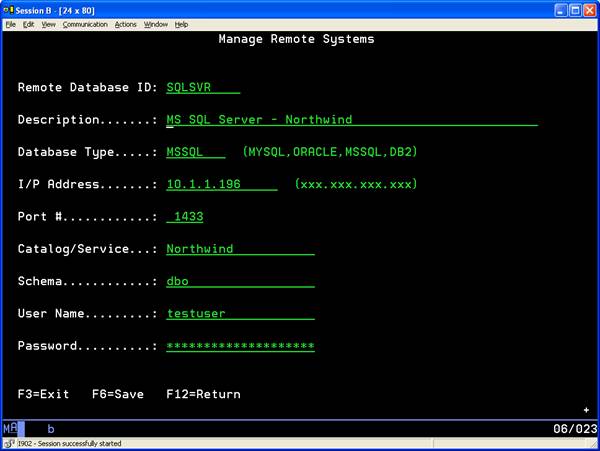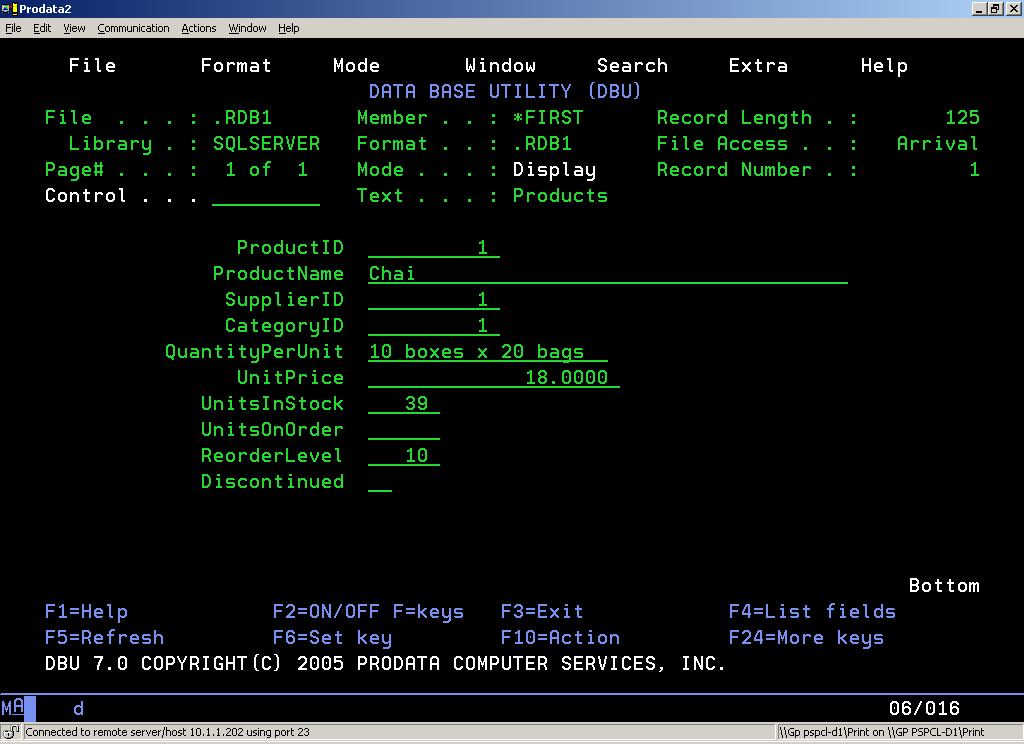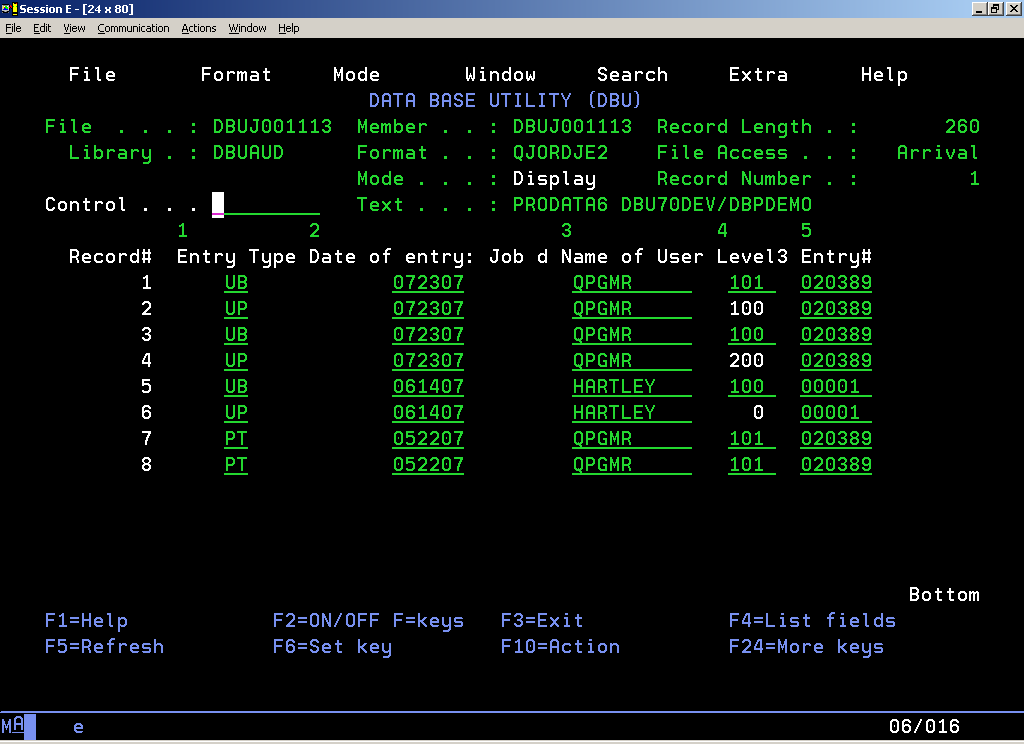Database processing is at the core of most IT applications. The processing of information usually involves the transaction of reading and updating records within a database. While the System i is at the heart of many database storage and transaction applications, more and more System i shops have data that is stored and accessed on other servers. Popular databases such as SQL Server, Oracle, and MySQL store important company data.
So how does a System i expert access this remote data? While there are some tools available on these remote systems, the time and effort it takes to learn them may not be cost-effective for your staff. Tools could be created using ODBC or JDBC, but again, this is time and effort that could be used more wisely.
For those familiar with DBU, database utility on the System i, the answer would be to access the remote data using the new plug-in called DBU RDB (remote database) for remote access. DBU RDB enables access to databases and allows for DBU functionality to be deployed on remote servers from a central System i platform.

Figure 1: DBU RDB setup is easily configured, with the remote site identified. (Click images to enlarge.)
DBU performs typical functions like adding records, deleting data, or making modifications to the data. Unlike any other file editor, DBU offers both green-screen and graphical access to your DB2 data. DBU/GUI works well for those programmers working in the WDSc environment.
DBU RDB offers this same functionality in the green-screen mode and will soon be functional via the GUI. Hours spent learning other means to access databases on each system is eliminated. DBU RDB does the work. DBU RDB applications can also be created for users to automatically access remote data. Wilson Jones, a contractor out of Tulsa, Oklahoma, is doing just that.

Figure 2: Remote Data is displayed within DBU, database utility.
"We are using DBU RDB to access remote MS SQL databases imposed on us by outside
software companies. I would never have tolerated Microsoft integration given a choice, but I didn't have one in this case", said Jones. "IBM doesn't provide a native way for the System i to be a client to a remote SQL database, but DBU RDB does!"
Jones continued, "Since a lot of the company's data resides on Microsoft servers running MS SQL, we needed a way to examine and get that data into native System i physical files. DBU RDB does both!"
Sometimes clients are worried about security with a file editor on their system and with access to remote systems. To alleviate this concern, DBU offers security switches accessible upon installation on any system. A secure command, DBUAUT, is supplied with DBU to allow individual profiles to have different authority levels and default values. The functions within this command also control the operating environment for DBU. User profiles may be added, updated, deleted, or displayed with specific functionality assigned. DBU RDB adheres to the security policies of the remote database server as well as the System i security policies.
Another issue in IT shops is data tracking. The DBU Audit plug-in to DBU handles most auditing requirements. This software allows users to track and monitor DBU and DBU RDB changes and even the viewing of sensitive data on any System i file or remote file. This plug-in goes beyond the base DBU audit tracking by storing the tracking data for local and remote files in journals rather than spooled files. This simplifies the ability to track and report on changes to database files for regulatory compliance or internal control requirements.

Figure 3: Display the Audit Journal to see what modifications were made to the file. The before and after images are shown with the changes highlighted.
DBU Audit also offers a secure interface that allows the user to start or stop the auditing function, display or extract audit data for viewing or reporting, and maintain the integrity of the audit files. Combine DBU Audit's tracking and reporting mechanisms on System i data and remote databases with DBU Authority controls and the extensive tailoring of access and functionality within DBU, and the IT department's database audit requirements are met.
To learn more about DBU RDB or DBU Audit click here. And check out other ProData offerings in the MC Showcase Buyer's Guide.
Shelli Peck is VP of Business Development for ProData Computer Services, Inc.











 Business users want new applications now. Market and regulatory pressures require faster application updates and delivery into production. Your IBM i developers may be approaching retirement, and you see no sure way to fill their positions with experienced developers. In addition, you may be caught between maintaining your existing applications and the uncertainty of moving to something new.
Business users want new applications now. Market and regulatory pressures require faster application updates and delivery into production. Your IBM i developers may be approaching retirement, and you see no sure way to fill their positions with experienced developers. In addition, you may be caught between maintaining your existing applications and the uncertainty of moving to something new. IT managers hoping to find new IBM i talent are discovering that the pool of experienced RPG programmers and operators or administrators with intimate knowledge of the operating system and the applications that run on it is small. This begs the question: How will you manage the platform that supports such a big part of your business? This guide offers strategies and software suggestions to help you plan IT staffing and resources and smooth the transition after your AS/400 talent retires. Read on to learn:
IT managers hoping to find new IBM i talent are discovering that the pool of experienced RPG programmers and operators or administrators with intimate knowledge of the operating system and the applications that run on it is small. This begs the question: How will you manage the platform that supports such a big part of your business? This guide offers strategies and software suggestions to help you plan IT staffing and resources and smooth the transition after your AS/400 talent retires. Read on to learn:
LATEST COMMENTS
MC Press Online